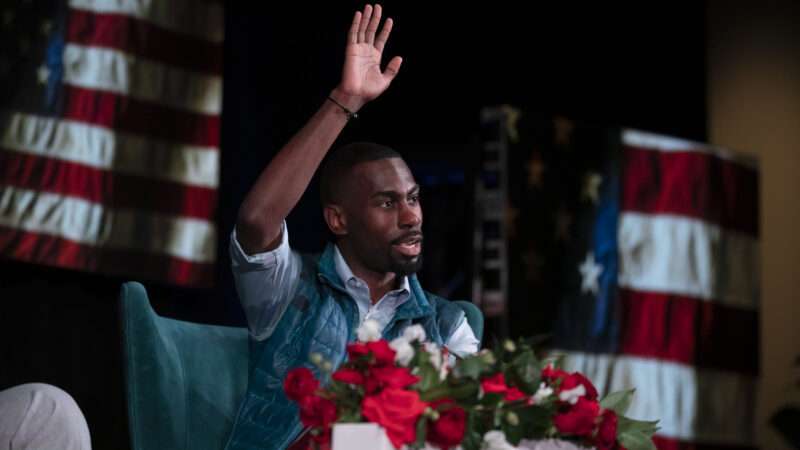
This week, a federal court in Louisiana dismissed a lawsuit against protest organizer DeRay Mckesson, putting an end to a case that stretched many years and threatened to chill First Amendment–protected speech.
In July 2016, police officers in Baton Rouge shot and killed Alton Sterling, a black man selling CDs outside a convenience store, while they pinned him to the ground. The shooting sparked protests around the country.
At a Black Lives Matter march in front of the Baton Rouge Police Department just days later, protesters scrapped with police, in some cases throwing water bottles. One demonstrator allegedly threw a rock or a piece of concrete that hit Officer John Ford in the head, causing severe head injuries and knocking out teeth. That protester was never identified, but it was not Mckesson, an activist who allegedly organized the protest.
Regardless, Ford (initially identified as "Officer John Doe Police Officer") sued Mckesson in November 2016. The lawsuit claimed negligence, charging that Mckesson "knew or should have known [his] actions could cause and/or lead to serious personal injury." While admitting that Mckesson never committed or even directly encouraged violent acts, Ford claimed in an amended complaint that Mckesson had "justified" violence in interviews.
In September 2017, the U.S. District Court for the Middle District of Louisiana granted Mckesson's motion to dismiss the case with prejudice, meaning Ford could not refile.
Chief Judge Brian A. Jackson cited NAACP v. Claiborne Hardware (1982), in which the U.S. Supreme Court unanimously found that "the right to associate does not lose all constitutional protection merely because some members of the group may have participated in conduct or advocated doctrine that itself is not protected," including violence. Since Ford "failed to plead sufficient, nonconclusory factual allegations that would tend to demonstrate that Mckesson exceeded the bounds of protected speech," Jackson wrote, "Mckesson cannot be held liable for the conduct of others with whom he associated."
But in December 2019, the U.S. Court of Appeals for the 5th Circuit reversed the dismissal and remanded the case back to the district court. "By ignoring the foreseeable risk of violence that his actions created, Mckesson failed to exercise reasonable care in conducting his demonstration," wrote Judge E. Grady Jolly for the majority. "Mckesson owed Doe a duty not to negligently precipitate the crime of a third party. And a jury could plausibly find that a violent confrontation with a police officer was a foreseeable effect of negligently directing a protest."
"'Negligent protest' liability against a protest leader for the violent act of a rogue assailant is a dodge of Claiborne Hardware and clashes head-on with constitutional fundamentals," Judge Don Willett noted in dissent. "Such an exotic theory would have enfeebled America's street-blocking civil rights movement, imposing ruinous financial liability against citizens for exercising core First Amendment freedoms."
Earlier this year, the U.S. Supreme Court declined to take up the case. Justice Sonia Sotomayor pointed to the Supreme Court's 2023 decision Counterman v. Colorado. "The Court explained that 'the First Amendment precludes punishment [for incitement], whether civil or criminal, unless the speaker's words were "intended" (not just likely) to produce imminent disorder,'" Sotomayor wrote.
This week, the district court again decided in Mckesson's favor, finding Ford's claims insufficient under both Louisiana law and the First Amendment, once again dismissing his lawsuit with prejudice. In its decision, the court even spelled out the absurdity of some of the suit's underlying claims.
"According to Defendant, he 'did not engage in any acts of violence at the protest,'" Jackson again writes for the majority. "Plaintiff attempts to rebut this, responding that Defendant 'likely threw his water bottle at police,' and citing to briefing in which Plaintiff argues that because police officers and Plaintiff saw Defendant retrieve a bottle of water, '[o]ne may infer that [Defendant] likely threw his bottle of water at police.'" Jackson calls this an "absurdly speculative inferential leap," especially since Ford testified that "'[he] never saw [Defendant] throw a water bottle' and nobody 'told [him]' Defendant had done so."
"The Supreme Court has long recognized that peaceful protesters cannot be held liable for the unintended, unlawful actions of others, and we're delighted to see that the district court came to the same conclusion," said David Cole, legal director of the American Civil Liberties Union, which acted as part of Mckesson's legal defense team.
Indeed, the decision is a positive outcome. But the case stretched on for an absurdly long stretch of time. In a statement, Mckesson called it "a grueling eight-year process"—eight years in which an injured police officer sought to use the legal system to punish him despite never accusing him of direct violent action. And in that time, dueling court decisions couldn't come to an agreement over whether nonviolent protest activity was truly protected by the First Amendment.
The post Louisiana Federal Court Affirms the Right To Peacefully Protest appeared first on Reason.com.







